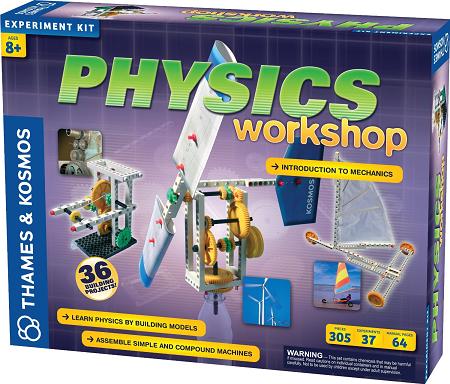Physics Game
Kids Learn Physics By Playing A Physics Game
Playing a physics game is a great way to study the laws of physics all while having fun. Physics kits allow kids to learn about various physics concepts. Kids conduct various experiments and build machines. In the process, they learn how machines function and about basic forces and the fundamental laws of physics.For example, by building cranes, levers, gears, pulleys or windmills, they learn about the laws of mechanics. Players can also learn about more advanced topics such as aerodynamics, hydraulics, solar energy, oscillation, etc. Or how solar energy can be turned into electricity. And how a ships floats and how a plane flies. Another great aspect of physics games is that they include manuals containing pictures that teach not only how to build the machines, but also how to conduct experiments. The manuals also explain the related scientific concepts and some fundamental laws of physics.

Thames and Kosmos Physics Workshop |
As they work on these wonderful machines, kids can also develop a passion for physics and engineering. These games can also be enjoyed by both adults and children and parents and children can work on these machines together at home. We recommend the Thames and Kosmos games. For beginners, we recommend the Thames and Kosmos Physics Workshop (ages 8 and above). With this kit, kids run experiments that will help them understand basic physic concepts and the basic laws of mechanical physics. Players learn how to build machines such as a windmill, a scale, a crane, a pendulum clock and they experiment with levers, gears, pulleys, wheels and axles. It includes also a very helpful experiment manual that helps players understand the most fundamental physics equations and basic principles in physics. The set is not only very educational but also durable and well designed which is another reason why we highly recommend it.
A web site that focuses on better parenting through games and geekiness
Another more advanced game is the Thames and Kosmos Physics Pro (ages 10 and above, buy on amazon here). This game is a best seller and has received many awards including the Parent’s Choice Silver Honor. It is Thames & Kosmos biggest and most advanced kit. With this kit, children study more advanced topics in physics, such as energy, oscillation, fluid dynamics, hydraulics. Being more advanced, the machines being built are even more impressive. For example, instead of levers players now build a hydraulic lift and other amazing machines. They learn more about two basic fluids: water and air and how a current of water can be converted into electricity. The game also includes a manual which contains many experiments to be performed and instructions to build impressive real-world machines.
There is another Thames and Kosmos game that we recommend because it teaches about solar energy. It is called the Thames and Kosmos Physics Solar Workshop (ages 8 and above) and it was developed with the help of Greenpeace in Germany. Kids build solar-power cars, trucks, elevators, fans, cranes and various other machines that run with solar energy and in the process learn about using solar power and photovoltaic cells.
Return from Physics Game to Science Games
Return from Physics Game to Homepage